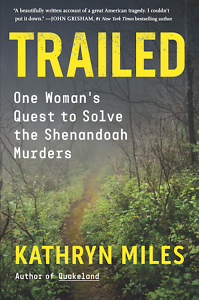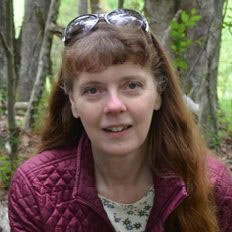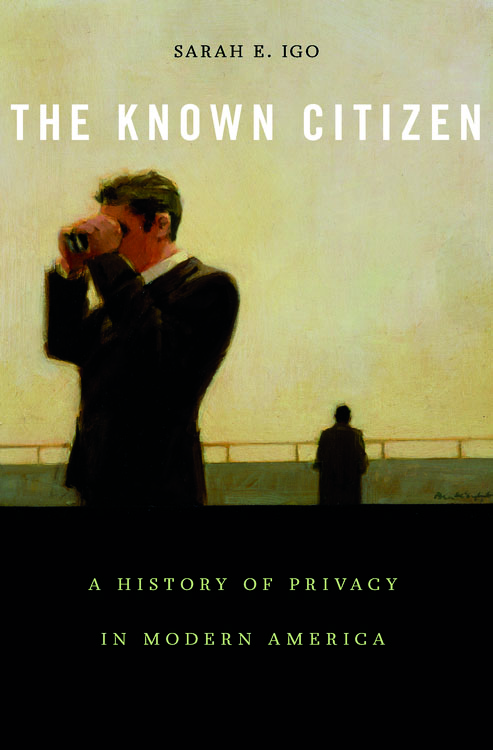Tracking a Killer
Journalist Kathryn Miles trails a 1996 cold case
Near the end of Kathryn Miles’ Trailed: One Woman’s Quest to Solve the Shenandoah Murders, the author recalls the day someone asked her why she was so determined to help discover who killed Julie Williams and Lollie Winans in Shenandoah National Park in May 1996.

The two women, trained backcountry leaders in their 20s, beloved in their respective communities, had been found dead — bound, gagged, throats slit — at their campsite near a stretch of the Appalachian Trail that runs through the park. No one has been convicted of their murder.
Miles didn’t respond immediately. At first, the longtime journalist, professor, and author of five books had simply wanted to find out what happened to Williams and Winans, whose case had gone cold partly because authorities lacked sufficient evidence to convict their prime suspect. But the more she learned about the investigation, the more incredulous she became — not only about the way evidence was originally handled but because “missteps and omissions” pointed to “a larger systemic problem in our justice system.” The problem is particularly acute when it comes to violence against women and others marginalized in the highly masculinized culture of outdoor pursuits. A hiker herself, Miles knew the murders robbed many women of their right to feel safe in the wilderness, including national parks.
Finally, Miles answered, she was just tired of feeling scared.
Miles first became interested in the Williams-Winans murder after joining the faculty of Unity College in Maine, where Winans had been a student. Many of Miles’ new colleagues remembered Winans, whose dry wit, generosity, and determination impressed them. They knew she’d had a challenging home life, despite family wealth. She was also gay, which was still difficult in the “don’t ask, don’t tell” 1990s.
 During her four-year investigation, Miles approached her quest from multiple perspectives, interviewing the victims’ families, friends, and professors, as well as investigators with the National Park Service and the Federal Bureau of Investigation. She gained access to a multitude of documents, not only about the Williams-Winans case but the murders of other women. She asked questions others hadn’t, pursuing details such as the non-standard width of duct tape used to bind the women, and she obtained a 1990s catalog from a manufacturer of “adult” products to compare crime-scene evidence. She even found and interviewed other hikers who’d been in the park when the pair were murdered, including a group of women who were rebuffed when they tried to report an encounter with a man who knew about the killings before they were made public.
During her four-year investigation, Miles approached her quest from multiple perspectives, interviewing the victims’ families, friends, and professors, as well as investigators with the National Park Service and the Federal Bureau of Investigation. She gained access to a multitude of documents, not only about the Williams-Winans case but the murders of other women. She asked questions others hadn’t, pursuing details such as the non-standard width of duct tape used to bind the women, and she obtained a 1990s catalog from a manufacturer of “adult” products to compare crime-scene evidence. She even found and interviewed other hikers who’d been in the park when the pair were murdered, including a group of women who were rebuffed when they tried to report an encounter with a man who knew about the killings before they were made public.
Far from true-crime sensationalism, Trailed paints a heartbreaking portrait of two promising young women’s lives cut short and a sobering picture of how murderers slip through cracks in the justice system. Williams, a Carleton College graduate, majored in geology and spent so much time helping women in Mexico that her friends called her a “one woman Peace Corps.” Drawn to the wilderness, she joined Woodswomen, an organization founded to “buck the longstanding masculine model for getting women outside.” That’s where she met Winans, an environmental studies major, and the two fell in love. Miles suggests the women may have been killed because they were flouting patriarchal norms, not only as lesbians but as women camping without male companionship. Such norms muddy the investigative process, as well as restrict women’s serenity outdoors — a problem worth addressing in its own right, Miles argues.
What went wrong with the investigation comes across as less the fault of individual investigators than a problem with unsound procedures and assumptions. Early in the book we learn that accepted methods of gathering evidence are focused on crimes committed inside buildings, with little guidance for outdoor environments. Moreover, investigators spent valuable time pursuing a heterosexual narrative largely irrelevant to a gay couple’s lives. One early suspect was Winans’ former fiancé, with whom she maintained an amiable relationship. Another was Williams’ male roommate, who investigators assumed was jealous because Williams took up with a woman, though the roommate had only been a platonic friend.
Miles faults confirmation bias — i.e., the tendency to look for evidence that supports investigators’ theories. Because the women were gay, former Attorney General John Ashcroft did finally declare the murders a hate crime, but the man indicted turned out not to be a match for DNA evidence taken from the scene. Comparing patterns from other crimes, Miles presents compelling evidence for a different suspect.
Trailed is a page-turner, but it is deeply disturbing — a point Miles acknowledges. She herself felt triggered at times, admitting that she had to force herself to look at photos of the women’s corpses, which felt invasive. Looking at what happened with a clear eye, though, may lead to solving this cold case and others.

Jane Marcellus is a writer whose published work includes literary nonfiction, critical analysis, and journalism. Her work was listed as “Notable” in Best American Essays 2018, 2019, and 2020. A former journalist, she previously covered murder trials in Tucson, Arizona.


